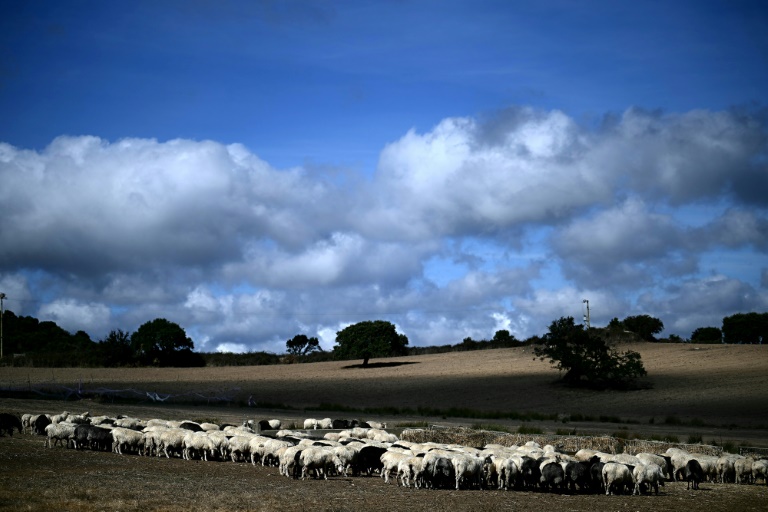In recent months, the Italian island of Sardinia has faced a severe outbreak of bluetongue, a viral disease that has devastated local sheep populations, resulting in the deaths of approximately 20,000 sheep this year alone. Sardinia, which is home to nearly half of Italy’s sheep population and plays a crucial role in the production of renowned cheeses like Pecorino, is suffering from the dual pressures of this disease and a severe drought exacerbated by climate change. Farmers like Michela Dessi report that the virus has appeared earlier than usual, with widespread symptoms among the flocks, including high fevers, difficulty breathing, and the abortion of lambs. Bluetongue, transmitted by biting midges, primarily devastates sheep populations, posing severe risks to their health and reproductive capabilities. Despite not affecting human health, the virus presents a significant challenge to the agricultural economy and animal welfare in the region.
The impact of bluetongue is visible across Sardinia, with reports citing approximately 3,000 outbreaks so far this year, a significant increase from the previous year’s 371. Farmers are struggling to cope with the consequences, witnessing horrific signs of the disease, including animals suffocating in their saliva due to the virus’s effects. The average infection rate for Dessi’s farm stands at about 60 percent, with a staggering 30 percent of her sheep resorting to abortions. The more severe symptoms lead to distressing fatalities, leaving farmers to helplessly watch their livestock deteriorate. Given that bluetongue infections have surged in terms of both number and severity, local agricultural and veterinary authorities are grappling with the urgent need to manage the outbreak effectively.
The dynamics of bluetongue outbreaks in Sardinia are closely linked to climatic changes, particularly those affecting the populations of the biting midges that transmit the disease. Experts warn that climate change not only influences the timing and severity of the virus’s outbreaks but also threatens to extend the duration of illness in afflicted animals. Sources indicate that the climatic conditions are shifting seasonal patterns of both the midge populations and the virus, prompting concern for increased occurrences across Europe, as evidence of the disease has emerged in various countries like France, Spain, and Germany. Sardinia has faced bluetongue outbreaks since 2000, but local farmers and advocacy groups argue that the response from authorities has not kept pace with the rising threats and challenges they face each year.
An exacerbating factor in mitigating the bluetongue crisis has been the delayed vaccination efforts by local authorities. The expected vaccination for sheep typically occurs in March or April; however, this year the region did not provide vaccines until mid-June, when the virus had already begun spreading. It’s argued that vaccination efforts could have been more effective if executed in a timely manner, as the virus continues to affect herds post-vaccination due to evolving viral variants. Not only do farmers face issues with proper baiting of their flocks, but some are also hesitant to fully vaccinate, worried about potential side effects or the efficacy of the vaccines against this year’s strains. The consequences of incomplete vaccination efforts contribute significantly to the rise in mortality rates among unvaccinated sheep.
While vaccination is crucial, experts suggest that more comprehensive measures need to be implemented to combat the spread of bluetongue effectively. According to research from the veterinary institute, targeted measures focusing on high-risk areas could potentially prevent the initial outbreaks. The current challenges underscore the necessity for coordinated efforts from the regional authorities to supplement vaccination with other strategies, such as area disinfection and the deployment of midge repellents. There is a call from agricultural representatives such as Battista Cualbu from Coldiretti in Sardinia for a more robust approach that includes broader disinfection techniques as well as improved management of midge vectors, which could lead to reduced economic repercussions resulting from livestock deaths and subsequent income loss.
As Sardinia braces itself for the colder months, there seems to be a glimmer of hope regarding the potential decline in bluetongue cases with the dropping temperatures. However, the implications of this year’s outbreak resonate deeply with farmers who have lost significant portions of their herds and incurred financial losses. With compensation for lost livestock still pending and reevaluation of the compensation rates necessary, there remains a lingering sense of dread among farmers like Michela Dessi. Having already buried numerous sheep in makeshift mass graves, the creeping fear of what remains of the outbreak pushes farmers to reckon with the fragility of their livelihoods in the face of a protracted health crisis in their livestock. As authorities continue to combat the situation, farmers must remain vigilant during this challenging period, hoping for more effective measures and timely responses moving forward.

